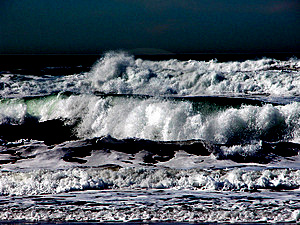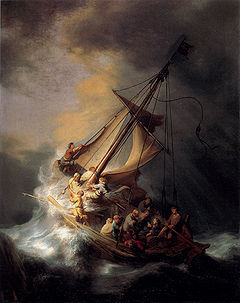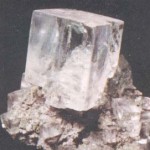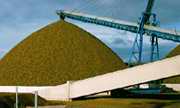Last night Jack, his cousin-dog Sydney, and I were out walking under twinkling stars. The wind was fierce, but the sky clear and the moon bright, coaxing me to put my flashlight away.
When we got to the corner where we had to decide to walk toward the beach or turn away from it, both dogs ran a bit toward, as if to say, “Please?” Although it was after midnight, I gave in, and we headed for the sound of roaring waves. They raced up the hill ahead of me, anticipating happy dances and creek cocktails.
When I got there, they were well into their playtime, romping in the dune grass and rolling down the hills. Crashing waves were iridescent in the moonlight, and the wind was gale-force. I put my hood up to shield my eyes from blowing sand, but it didn’t do much good. In just a few minutes my teeth were gritty, and sand was up my nose. Our visit was brief.
Today the waves were still wild, despite calmer winds. In a massive body of water like Lake Michigan, it takes nearly 24 hours for the water to calm after the winds cease, and my mind wandered to the biblical story of another stormy lake. The Sea of Galilee was known for unexpected storms just like Lake Michigan, and tradition says the Jews shied away from it for that reason.
In the story, it was Jesus who suggested they climb in a boat and head out onto the lake to get away from the ever-present, ever-needy crowds. If the disciples worried about a sudden squall, they kept it to themselves. Jesus, exhausted from non-stop ministry, fell right to sleep in the boat.
Knowing how badly he needed rest, they let him sleep, but eventually the storm they feared blew up, and panic moved them to wake him. He commanded the wind and waves to quit, and afterwards probably resumed napping.
Today while standing at the shoreline, it occurred to me Jesus really performed two miracles that night: halting the wind, and leveling the water, which normally would take a day or so. Looking up the story at home, I noticed something else.
The disciples were afraid of the raging wind and swamping waves, but after Jesus eliminated both, they should have been comforted. But Scripture says they had moved from fearful to terrified. Of what?
Of Jesus! (Mark 4:41)
Though they’d watched him perform wonders before, this time they saw the immensity of his power and that he can use it however he wants. What restrains him from using that power to eliminate every problematic person, place or thing from this world?
Love.
Love for his disciples motivated him to use his power against the storm. Love for us motivates him to refrain from using his power against us.
It’s all about his love.
“One thing God has spoken, two things I have heard: “Power belongs to you, God, and with you, Lord, is unfailing love.” (Psalm 62:11-12a)








